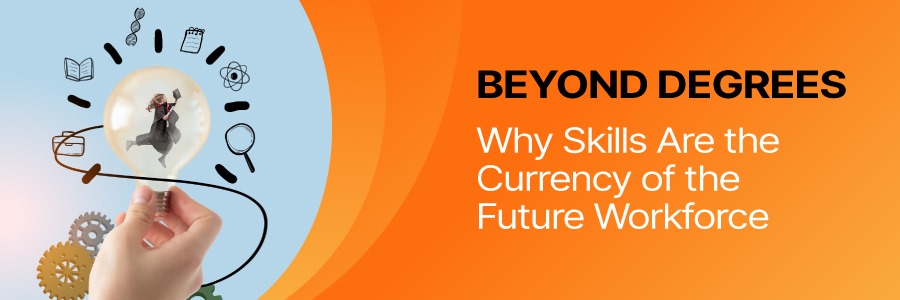
By: Creonow
These days, the traditional reliance on degrees as proof of competency is being overshadowed by a new metric of value: skills. As industries evolve rapidly, employers prioritize what you can do over what you studied.
According to a World Economic Forum report, nearly 50% of workers will need reskilling by 2025 to meet the changing demands of the job market. Skills like adaptability, creativity, and technical know-how are becoming indispensable. Let's explore why skills are becoming the foundation of the future workforce.
Why Degrees Are Losing Their Monopoly/Dominance?
While degrees were once the gold standard for hiring, they often fail to reflect the real-world capabilities of a candidate. Many graduates find themselves unprepared for the practical demands of their roles.
In contrast, skills-based hiring focuses on demonstrable abilities, allowing employers to find talent that aligns directly with job requirements. For instance, tech companies like Google and Apple no longer mandate degrees. Instead, they focus on coding proficiency, problem-solving, and creativity.
The Influence of Automation and AI
Automation and AI are reshaping industries, eliminating some roles and creating new ones. This rapid transformation has made specific, up-to-date skills far more valuable than static qualifications. Data analysis, cybersecurity, and AI development are high-demand skills that often surpass degree requirements.
The Shift to Skill-First Hiring
What Employers Want?
Employers today are looking for individuals who can deliver immediate value. According to LinkedIn’s Global Talent Trends report, 69% of professionals believe verified skills are more important than degrees in hiring decisions.
Skills such as:
Technical skills: Coding, data analysis, and AI proficiency.
Soft Skills: Communication, adaptability, and emotional intelligence.
How Skills Are Measured?
The rise of certifications, boot camps, and online courses has democratized access to skill-building opportunities. Many education platforms allow learners to gain industry-relevant skills at a fraction of the cost and time of traditional degrees.
Advantages of a Skills-Based Workforce
Diverse Talent Pools:
Skills-first hiring creates opportunities for individuals from non-traditional backgrounds, nurturing diversity and inclusion in the workplace. People who may not have had access to formal education can still showcase their expertise through portfolios, certifications, or project work.
Continuous Learning Culture
Focusing on skills promotes a culture of lifelong learning. Employees are motivated to continually upgrade their knowledge, keeping companies agile and competitive in evolving markets.
Enhanced Productivity
When employers match candidates’ skills directly with job requirements, they create teams that are efficient and innovative. Employees feel more competent and confident, leading to higher productivity.
Challenges of Moving Beyond Degrees
Resistance to Change:
Many organizations still rely on degrees as a “safe” way to evaluate candidates’ potential. Changing this mindset requires a shift in traditional hiring processes and attitudes.
Skill Verification
Unlike degrees, verifying skills can be challenging. Employers need reliable systems to assess whether candidates truly possess the abilities they claim to have.
The Risk of Over-Specialization
Focusing too narrowly on specific skills can make employees less adaptable to broader roles. Striking a balance between specialization and versatility is important.
How to Thrive in a Skills-Driven Workforce?
Besides the revolutions, employees and the workforce should learn how to survive in this dynamic industry. Here is what they should do:
Lifelong Learning:
To stay competitive, individuals must commit to continuous learning. Platforms offering micro-credentials, short-term courses, and certifications are excellent ways to keep skills sharp.
Build a Portfolio
A strong portfolio showcasing real-world projects is more valuable than a degree for many employers. It provides tangible proof of your skills and capabilities.
Focus on Soft Skills
While technical skills are crucial, soft skills like critical thinking, teamwork, and communication are equally important. These transferable skills ensure adaptability in any role.
Industries Adopting Skills-First Approaches
Technology:
The tech industry has long championed skills over degrees. Roles like software development, UX design, and data science often prioritize practical abilities over academic qualifications.
Creative Fields:
In areas/industries like design, writing, and marketing, portfolios and experience far outweigh degrees. Platforms like Behance and LinkedIn serve as showcases for creative talent.
Healthcare
Even in regulated industries like healthcare, skill-based certifications in telehealth, medical coding, and AI-driven diagnostics are gaining prominence.
The Role of Organizations in Fostering Skills
For individuals, having a mindset of continuous learning is the key to staying relevant. For organizations, investing in skill-based hiring and development is important for long-term success. Together, they can build a future that prioritizes innovation and progress.
Investing in Employee Development:
Companies must prioritize upskilling programs to ensure their workforce remains competitive. For example, Microsoft’s Global Skills Initiative has trained over 42 million people in digital skills.
Redefining Job Descriptions:
Organizations should avoid degree-centric job postings and focus on outlining specific skill requirements. This ensures a wider, more qualified talent pool.
Creating Skills Verification Systems:
Implementing reliable methods to assess candidates’ skills, such as tests, project-based interviews, or skill-based simulations, is essential for effective hiring.
Wrapping up
The future workforce belongs to those who adapt, learn, and grow. As industries evolve at lightning speed, skills have become the ultimate currency, surpassing the once-dominant degree-based criteria. By focusing on demonstrable abilities, employees and employers can thrive in a landscape that rewards talent, creativity, and adaptability.